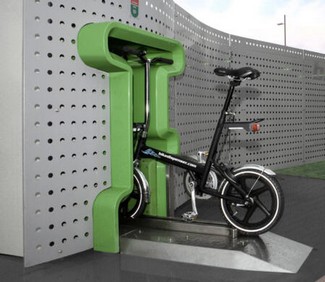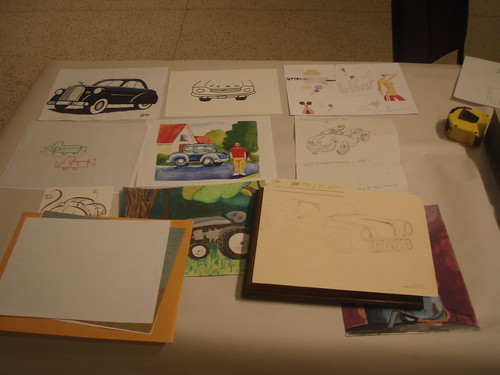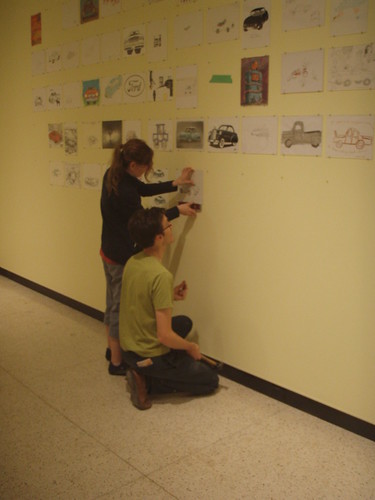The self-service bike idea continues to spread. Dijon is next-up in France according to
Ma Ville a Vélo. The metro area of this city will start off with 400 bicycles. The program models on the
Vélib system in Paris, but the contractor is different:
Clear Channel, an American company which successfully put self-service bikes in Barcelona last spring.
Not surprisingly, a Dutch company has announced a pilot program for self-service bikes in Amsterdam. Here's a brief account in RedFerret:
The Bike Dispenser - bicycle vending machines reach Europe at last

The Bike Dispenser…er…dispenses bicycles. On demand. The service is only at pilot stage at the moment in Eindhoven in the Netherlands, but it sounds perfect for most places if the concept works out. You pay a subscription to obtain a smartcard and PIN number and use that to rent a bike at any of the vending machines you find (the plan is to site them at places like railway stations, park and ride etc). Just stick your card in the slot, enter the code and 15 seconds later out pops a bike for you to use. When you’re done just pop it back into the slot and your rental period ends. The best thing is the fact that you can return them to different dispensers around town, which is v. cool.

The company,
Bikedispenser, says they are placing bikes at commuter stations in Amsterdam and that "projects in several other cities are in preparation."
Despite the success of Vélib and the growth of the self-service idea throughout western Europe, the press has been mostly silent. One major exception is an
article in the Economist which tells us:
Vélib' (for vélo, or bicycle, and liberté, or freedom) has taken Paris by storm. More than 10,000 bikes have been installed at 750 docking stations, which is half of the scheme's eventual capacity, says Jean-François Decaux, the son of the founder and co-chief executive of the family-controlled firm along with his brother, Jean-Charles. The bicycles have been used by 4m people so far, who have clocked up 100,000 rides a day. Last week Jean-François was in Moscow for talks with the mayor, who is keen to introduce a similar scheme there. The mayor of Chicago also expressed interest in importing Vélib' during a recent visit to Paris.

You wouldn't know it from reading our local papers, but Washington DC is one of the US cities that's poised to experiment with the program. Here's an extract from a statement from by local politician:
DC to Launch Bicycle Rental Program
Smart Bikes (photo credit: Clear Channel Outdoors) DDOT is considering an automated bicycle rental system in DC in partnership with Clear Channel. Similar to car sharing, the system would allow members to swipe a card and release a bike from a kiosk (DDOT says to think of it as kind of like an airport luggage carts -- but better). According to DDOT, Clear Channel is operating similar systems in Europe, and this would become the first of its kind in the Northeast U.S. The proposed contract will allow for 120 bikes at 10 kiosks
The scale of the DC program is small and this bureaucratic timidity seems likely to doom the experiment from the outset. The likelihood that you'll find a bike at your urban start point and a rack in which to leave it at your end point is much too small.
To compare: DC has about 600,000 people; will get 120 bikes. The Dijon metro area has less than half the people but will get more than 3 times the bikes (400 for about a quarter of a million people). Paris has a couple million souls and more than 10,000 bikes at 750 locations.
The DC bike program might expand if there's demand for it and good publicity would help stimulate demand. Unfortunately, there's been very little public annoucement at all. Other than the politician's web blurb, I can find only that the program has been promoted on BikeWashingtonDC, the local bike advocacy discussion list. There, you can read a project description: Subject:
Automated Bike Rental coming to DC. Trouble is, most of the people who read this list are already committed to cycling; the people targeted by the self-service systems in Europe are those who don't currently use bikes to get around.
Wired Blog had a
post on the Barcelona system soon after it opened last spring. This photo comes from the post (click to see full size):

An
editorial on a Spanish site for tourists says the Bicing program has been very successful to the extent that 70,000 bike rides are taken in the city every day and complains that the city needs to create more bike lanes and enforce rules that help bicyclists compete with other traffic on city streets. The editorial includes this photo of Barcelona's mayor on his bike on the day the Bicing scheme was begun:
 Addendum:
Addendum: The papers today
are happy to tell us about the failure of China to control emissions from motor vehicles. This nation, once so heavily dependent on bike transportation is suffering more and more from automotive gridlock. Here, for example, is the intro to the piece distributed by Agence France-Presse:
China observes 'Car Free Day' with the usual gridlock
BEIJING (AFP) - More than 100 Chinese cities including Beijing staged a "Car Free Day" Saturday to fight congestion and pollution, but the streets of the capital remained defiantly clogged with traffic jams.
Beijing's middle class climbed into their cars to go shopping and touring as usual, apparently disregarding an injunction to leave the vehicles at home -- a pattern that seemed to be repeated in the other 107 participating cities.

Traffic in Beijing ©AFP - Teh Eng Koon













 I received a notecard from a friend at work. She sent it to thank me for a condolance. On front it shows the image at right, plum blossoms and camelias. The back contains all of chapter 11 of the Tao Te Ching by Lao Tsu.
I received a notecard from a friend at work. She sent it to thank me for a condolance. On front it shows the image at right, plum blossoms and camelias. The back contains all of chapter 11 of the Tao Te Ching by Lao Tsu.  Ursula Le Guin's version:
Ursula Le Guin's version: She says: "One of the things I love about Lao Tzu is he is so funny. He's explaining a profound and difficult truth here, one of those counter-intuitive truths that, when the mind can accept them, suddenly double the size of the universe. He goes about it with this deadpan simplicity, talking about pots." (p. 14)
She says: "One of the things I love about Lao Tzu is he is so funny. He's explaining a profound and difficult truth here, one of those counter-intuitive truths that, when the mind can accept them, suddenly double the size of the universe. He goes about it with this deadpan simplicity, talking about pots." (p. 14)

 You wouldn't know it from reading our local papers, but Washington DC is one of the US cities that's poised to experiment with the program. Here's an extract from a statement from by local politician:
You wouldn't know it from reading our local papers, but Washington DC is one of the US cities that's poised to experiment with the program. Here's an extract from a statement from by local politician: 


 Race photos here.
Race photos here.

 Today's stage of the Vuelta was a grueling one. Long and mountainous, finishing at the top of the highest point in the race. The Rabo team worked hard to protect the race leader, Denis Menchov. The work paid off as he took the stage and added to his overall lead. Joost Posthuma was one of a handful of racers who rode at the front of the pack to pull back a group that escaped early on. The overall speed was higher than expected, around 25 mph. Temperatures reached a high of about 85 deg. f. on the flats and dropped to the mid 50s at the top of the climbs.
Today's stage of the Vuelta was a grueling one. Long and mountainous, finishing at the top of the highest point in the race. The Rabo team worked hard to protect the race leader, Denis Menchov. The work paid off as he took the stage and added to his overall lead. Joost Posthuma was one of a handful of racers who rode at the front of the pack to pull back a group that escaped early on. The overall speed was higher than expected, around 25 mph. Temperatures reached a high of about 85 deg. f. on the flats and dropped to the mid 50s at the top of the climbs.
 So far,
So far,  And, having done well on the mountain sages, Denis Menchov has taken over the lead in the general classification.
And, having done well on the mountain sages, Denis Menchov has taken over the lead in the general classification. 






 I didn't find out how it came into their lives, but I believe
I didn't find out how it came into their lives, but I believe  I've observed an enormous increase in traffic during the three decades I've lived in the near suburbs of Washington DC. Studies, such as
I've observed an enormous increase in traffic during the three decades I've lived in the near suburbs of Washington DC. Studies, such as 
 As of 2007, similar schemes are also in effect in other European cities, including Barcelona, Brussels, Copenhagen, Lyon, Stockholm and Vienna.
As of 2007, similar schemes are also in effect in other European cities, including Barcelona, Brussels, Copenhagen, Lyon, Stockholm and Vienna.


